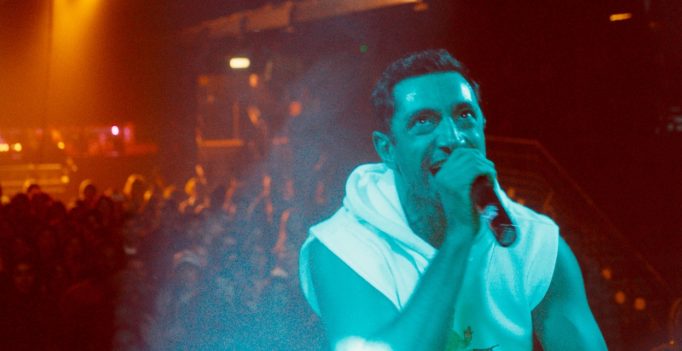By: Trevor Chartrand
Director Bassam Tariq and actor Riz Ahmed (Nightcrawler, Sound of Metal) are the co-writers of BBC Films’ Mogul Mowgli, and together they explore the concepts of family, tradition, and cultural identity/responsibility with their recent collaboration.
The film features Ahmed as Zed, an aspiring British Pakastani rapper on the brink of major success. As he is about to begin a career-defining concert tour, the sudden onset of muscular failure lands him in the hospital with a stalled career. While in his hometown hospital, the family he has been avoiding for years confront him about the direction his life has taken, and where this illness will take him in the future.
Ahmed, as always, turns in an excellent performance this go-round. He’s very natural and subdued here, and builds a compelling and relatable character. Most notably, he performs all of Zed’s music in the film as well, and his rapid-fire lyrics are a gift to the ears. It’s unexpected, but not surprising, to discover more of the endless depth of his talent with each performance. Without a doubt, Ahmed is a considerably underrated performer.
While Mogul Mowgli is not a love story, this film does share some commonalities with 2017’s The Big Sick; both films feature a Pakistani artist struggling with cultural identity, all while facing down a potentially deadly illness. Unlike Kumail Nanjiani’s romantic comedy though, Mogul Mowgli takes a much darker, more sincere approach to the material. In many ways, the film feels much more raw and bare. These filmmakers clearly have a passionate take on their subject matter, and have made one hell of an authentic movie.
Because of the film’s authenticity though, the overall pacing of this piece suffers greatly. Unlike the lightening-fast lyrics Zed spews into his microphone, this movie certainly drags its feet. The film successfully captures the feeling of anxious boredom you’d experience while waiting in a hospital room for diagnoses and test results. Patient viewers will be rewarded with the most interesting moments poking their head out during the film’s final act, but it may not be easy to make it that far.
In all fairness, my own ignorance could be a factor in enjoying the flow of the film. While this film is accessible enough for a Western audience, the target audience is going to be anyone who can relate to a similar family structure that is strict about culture and tradition. As an outsider, the religious and family traditions depicted in this film are admittedly foreign to me, and it’s very likely some of the more subtle moments of the film go over my head. Ultimately, the film speaks to the struggles of children growing up feeling they are in a limbo between two clashing worlds – and while I’ll never understand that struggle on a personal level, this movie certainly helps to define it for the unaware.
Overall, Mogul Mowgli is a moving drama that dares to answer questions about cultural identity that may seem unanswerable otherwise. While it suffers from a glacially slow pace, the passion of the filmmakers and the performers is present on screen, and will not go unnoticed.
**********
Do You Tweet? Follow These Tweeple:
Trevor Chartrand: @OhHaiTrebor





Be the first to comment